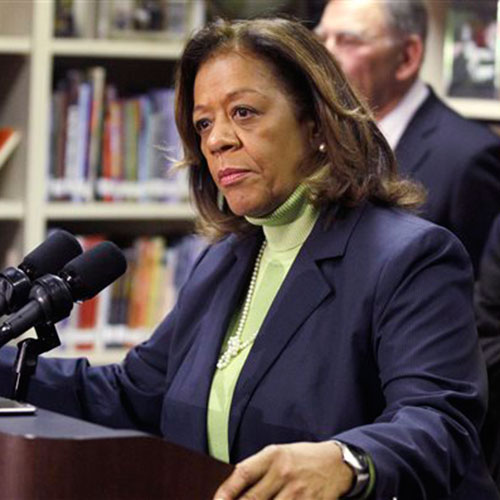Sign up for The Media Today, CJR’s daily newsletter.
When the former head of the Chicago Public Schools was indicted earlier this month in connection with a multi-million dollar bribery and kickback scheme, every media outlet in the city was on the story.
That wasn’t the case two years ago when Sarah Karp, a veteran education reporter, first disclosed details of a questionable $20.5 million no-bid contract to train school administrators. Karp’s initial reporting on the contract, which ran on the website of the newsmagazine Catalyst Chicago, didn’t make much of a splash. But it caught the attention of the school district’s inspector general, who reached out to Karp to learn more. It also drew notice from federal prosecutors, whose investigation into the case became public earlier this year—the US Attorney even made reference to Karp’s 2013 article when he announced the indictment this month. A few days later, the former schools chief, Barbara Byrd-Bennett, pleaded guilty to fraud.
It was an extraordinary coda to a story that Karp and Catalyst were responsible for breaking. The 25-year-old niche publication focuses exclusively on urban education issues in the home of the nation’s third largest school district, with veteran editors and reporters like Karp staying on the beat for years or decades at a time. Although it covers breaking news, Catalyst’s specialty is in-depth reporting.
“What we do is give our staff the gift that most journalists want, which is time,” said Linda Lenz, publisher and founder of Catalyst, which is published by the faith-based Community Renewal Society but is editorially independent. “Our journalists have time to go through reports. They become really expert on the nitty-gritty, how a school system works. And then they have the time to go after things.”
After noticing the comparatively large no-bid contract with a firm named SUPES Academy in June 2013, Karp said, she spent three or four weeks trying to learn more. Her article raised questions about the size of the no-bid contract and about Byrd-Bennett’s relationship with SUPES, where she had worked before coming to Chicago Public Schools.
“On the surface, CPS is paying for professional development,” Karp said. “It’s not that unusual. What stopped me was it’s a ton of money, and it’s an organization I didn’t know, and it was no-bid.”
SUPES got the contract just after Chicago Mayor Rahm Emanuel and his appointed school board announced that the closure of 50 elementary schools, in a controversial move that had consumed public attention. The timing was suspicious, Karp told Chicago Newsroom host Ken Davis when she appeared on his show in April.
“This was just something that immediately smelled funny to me,” she said.
The case has been widely covered in local media—and Karp’s role often acknowledged—since news of the federal investigation broke last spring. But Lorraine Forte, former editor-in-chief at Catalyst, said no other outlets followed the initial story.
“Nobody picked it up,” she said. “If the newspapers had more than one person [on K-12 education], they could be doing it. It’s just a matter of having the bodies.”
Catalyst itself, which has two reporters and an editor, is also shrinking. Forte’s top editor position was eliminated in June; Lenz, the publisher, is stepping down at the end of the year. And earlier this year Karp left Catalyst, where she was deputy editor, to join the Better Government Association, a nonprofit watchdog group that also produces investigative journalism.
Alexander Russo, a long-time education blogger and media critic at The Grade who has written for CJR, said the SUPES story is an example of both the strength and weakness of a publication like Catalyst.
“That’s the kind of story you get with a veteran reporter with a narrow beat,” he said. “But Catalyst doesn’t have the reach. A site like Catalyst can break a story, but there aren’t immediate political consequences.”
Fortunately, eventual consequences count for something, too. For any limitations it has, Catalyst provides vital coverage of the school district, which has about 400,000 students in more than 500 schools.
“They have seemed to have provided a really important role in making sure at least someone was paying attention to CPS especially in between elections and in between crises,” Russo said. “…They’ve provided a real continuity and real base.”
Looking ahead, Karp will continue reporting on public education for the BGA. Her former outlet deserves credit for breaking the story that was back in the news this month, she said.
“I could carve out the time,” Karp said. “There’s no other publication in town that can do it like that, and I want it to survive.”
Has America ever needed a media defender more than now? Help us by joining CJR today.



